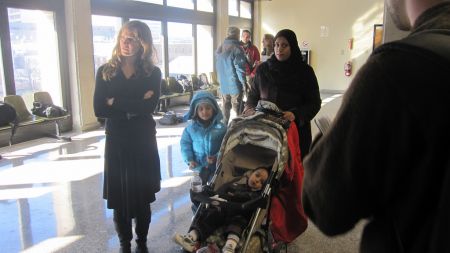HALIFAX – A local family of five facing deportation to Pakistan will have to wait a little bit longer to learn its fate.
Fakhira Chaudhry and Chaudhry Roouf Ahmad listened from the front row of a Federal Court of Appeal packed with supporters to arguments on whether they and their three children would be allowed to stay in Canada, but at the end of the 3-hour hearing Justice Robert Barnes reserved judgment in order to further examine evidence.
The family’s application to stay in Canada on humanitarian and compassionate grounds (H&C) was rejected in June of 2010. But their removal from the country, scheduled for August, was averted when the federal government declared a moratorium on deportations to Pakistan due to calamitous flooding.
The Chaudhrys are appealing the June ruling on the premise that the immigration officer who handled their case failed to take into account the best interests of their children, none of whom have ever been to Pakistan.
Defense lawyers John O’Neill and Lee Cohen argued that the case the family presented to the federal Department of Citizenship and Immigration – which included 650 pages of supporting material, including hundreds of letters of support from various individuals and organizations in the community – was dealt with in one business day, scarcely enough time to give due consideration to the applicants’ arguments.
Since the nature of a deportation hearing is a “winner-take-all,” said O’Neill, the decision maker must “fully review, not simply scan, all the materials” presented.
Crown prosecutor Monica Chan countered that though the Chaudhrys would certainly face hardship if they were forced to return to Pakistan, it was not clear that they would face “unusual or disproportionate hardship.”
Chan also argued that the Chaudhrys’ application had not included enough evidence to support their claim that their two daughters, aged 9 and 3, would face particular difficulties in Pakistan when compared to their lives in Canada.
“There are no country reports, no details of how the interests of the children are going to be compromised – only very general statements,” Chan said.
Outside the courtroom, supporters of the family who could not get seats in the courtroom milled about, some taking care of the Chaudhrys’ children while their parents sat in court. In total more than 100 people attended the hearing.
Evidently pleased with the show of support from the community, Chaudry Ahmad said numbers of people in the courtroom would have been even higher if not for -25 degree weather and the fact the hearing took place on a workday.
“In churches, in malls, thousands of people support us,” Chaudhry said.
Manzoor Ahmad, a friend of the family, noted the hardships the family faced from the protracted refugee process. “He’s been fighting more than seven years,” said Ahmad. “Every day he’s not sleeping well because of immigration stuff.”
“Everyone knows the situation in Pakistan,” Mr. Chaudhry said. “I look [to] my children’s future…This is my children’s home, my children’s country.”
“Media, you know more than me which countries have many problems,” he added, explaining why he continues to fight his family's deportation.
The Chaudhrys’ oldest daughter, Rukhna Roouf, was born in the United States and moved to Canada at the age of two.
“All my friends are here. I like the schools here,” she said. “Pakistan has bombs and stuff.”





